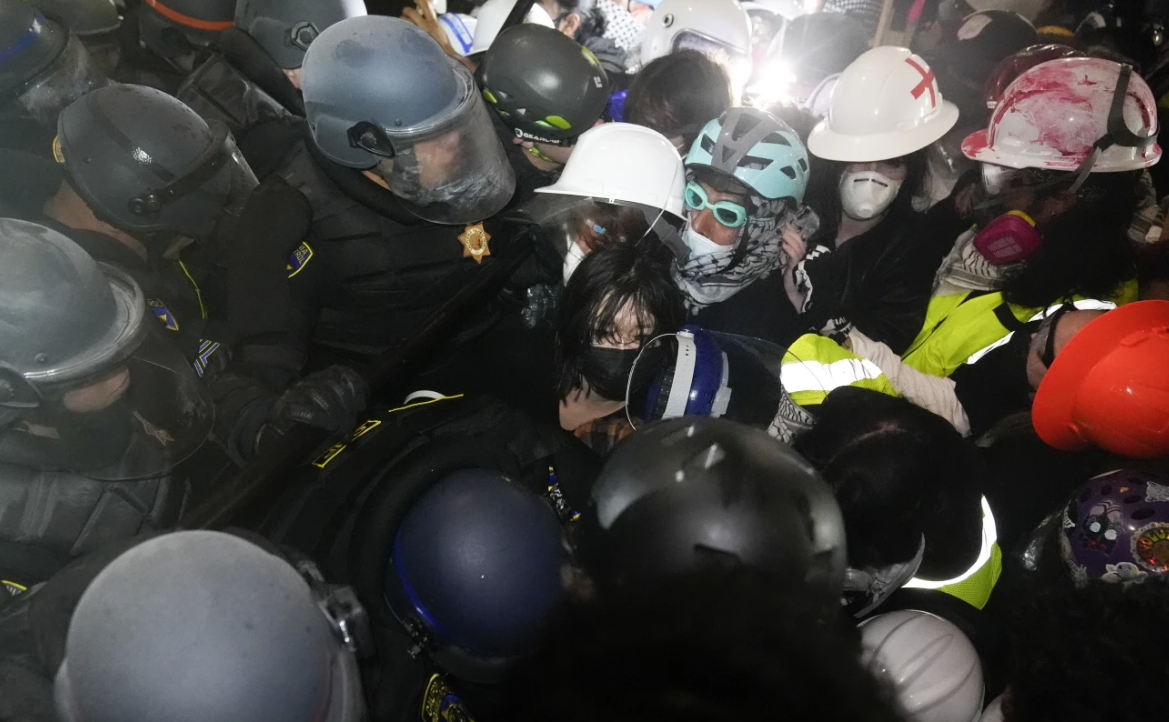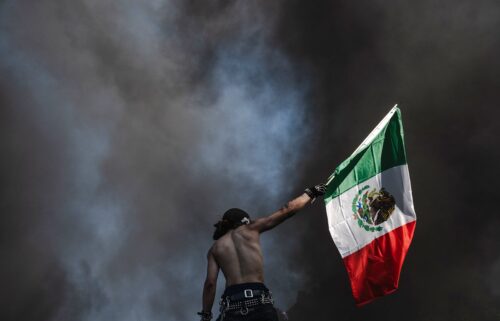Police and pro-Palestinian demonstrators clash in tense scene at UCLA encampment

LOS ANGELES (AP) — Police removed barricades and began dismantling pro-Palestinian demonstrators’ fortified encampment early Thursday at the University of California, Los Angeles, after hundreds of protesters defied orders to leave, some of them forming human chains as police fired flash-bangs to break up the crowds. Some people were detained, their hands bound with zip ties.
The action came after officers spent hours threatening arrests over loudspeakers if people did not disperse. A crowd of more than 1,000 had gathered on campus, both inside a barricaded tent encampment and outside it, in support. Protesters and police shoved and scuffled as officers encountered resistance. Video showed police pulling off helmets and goggles worn by some protesters as they were being detained.
With police helicopters hovering, the sound of flash-bangs, which produce a bright light and a loud noise to disorient and stun people, pierced the air. Protesters chanted, “Where were you last night?” at the officers, in reference to Tuesday night, when counter protesters attacked the encampment and the UCLA administration and campus police took hours to respond.
Tent encampments of protesters calling on universities to stop doing business with Israel or companies they say support the war in Gaza have spread across campuses nationwide in a student movement unlike any other this century. The ensuing police crackdowns echoed actions decades ago against a much larger protest movement protesting the Vietnam War.
In the Mideast, Iranian state television carried live images of the police action, as did Qatar’s pan-Arab Al Jazeera satellite network. Live images of Los Angeles also played across Israeli television networks, as well.
California Highway Patrol officers poured into the campus by the hundreds early Thursday. Wearing face shields and protective vests, they stood with their batons protruding out to separate them from demonstrators, who wore helmets and gas masks and chanted, “You want peace. We want justice.”
Police methodically ripped apart the encampment’s barricade of plywood, pallets, metal fences and trash dumpsters and made an opening toward dozens of tents of demonstrators. Officers also began to pull down canopies and tents. The number of protesters appeared to diminish through the morning as some voluntarily left with their hands up and police detained others.
The law enforcement presence and continued warnings contrasted with the scene Tuesday night, when counterdemonstrators attacked the pro-Palestinian encampment, throwing traffic cones, releasing pepper spray and tearing down barriers. Fighting continued for several hours before police stepped in, though no arrests were made. At least 15 protesters suffered injuries, and the tepid response by authorities drew criticism from political leaders as well as Muslim students and advocacy groups.
By Wednesday afternoon, a small city sprang up inside the reenforced encampment, full of hundreds of people and tents on the quad. Demonstrators rebuilt the makeshift barriers around their tents while state and campus police watched.
Some protesters said Muslim prayers as the sun set over the campus, while others chanted “we’re not leaving” or passed out goggles and surgical masks. They wore helmets and headscarves, and discussed the best ways to handle pepper spray or tear gas as someone sang over a megaphone.
Outside the encampment, a crowd of students, alumni and neighbors gathered on campus steps, joining in pro-Palestinian chants. A group of students holding signs and wearing T-shirts in support of Israel and Jewish people demonstrated nearby.
The crowd grew as the night wore on as more and more officers poured onto campus.
Ray Wiliani, who lives nearby, said he came to UCLA on Wednesday evening to support the pro-Palestinian demonstrators.
“We need to take a stand for it,” he said. “Enough is enough.”
UCLA Chancellor Gene Block promised a review of Tuesday night’s events after California Gov. Gavin Newsom denounced the delayed law enforcement response. The head of the University of California system, Michael Drake, ordered an “independent review of the university’s planning, its actions and the response by law enforcement.”
“The community needs to feel the police are protecting them, not enabling others to harm them,” Rebecca Husaini, chief of staff for the Muslim Public Affairs Council, said in a news conference Wednesday.
Meanwhile, protest encampments elsewhere were cleared by the police, resulting in arrests, or were closed up voluntarily at schools across the U.S. In New York, those included the City College of New York, Fordham University, Stony Brook University and the University of Buffalo. Others nationwide included Portland State in Oregon, the University of New Hampshire in Durham, Northern Arizona University in Flagstaff, and Tulane University in New Orleans.
Police burst into a building occupied by war protesters at Columbia University on Tuesday night, breaking up a demonstration that had paralyzed the school.
At the University of Wisconsin in Madison, a scrum broke out early Wednesday after police with shields removed all but one tent and shoved protesters. Four officers were injured. Four people were charged with battering law enforcement.
In rare instances, university officials and protest leaders struck agreements to restrict the disruption to campus life and upcoming commencement ceremonies. At Brown University in Rhode Island, administrators agreed to consider a vote to divest from Israel in October — apparently the first U.S. college to agree to such a demand.
The Associated Press tallied at least 38 times since April 18 where arrests were made at campus protests across the U.S. More than 1,600 people have been arrested at 30 schools.
The nationwide campus demonstrations began at Columbia on April 17 to protest Israel’s offensive in Gaza, which followed Hamas launching a deadly attack on southern Israel on Oct. 7. Militants killed about 1,200 people, most of them civilians, and took roughly 250 hostages. Vowing to stamp out Hamas, Israel has killed more than 34,000 Palestinians in the Gaza Strip, according to the Health Ministry there.
Israel and its supporters have branded the university protests antisemitic, while Israel’s critics say it uses those allegations to silence opposition. Although some protesters have been caught on camera making antisemitic remarks or violent threats, organizers of the protests, some of whom are Jewish, say it is a peaceful movement aimed at defending Palestinian rights and protesting the war.


